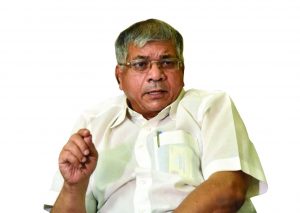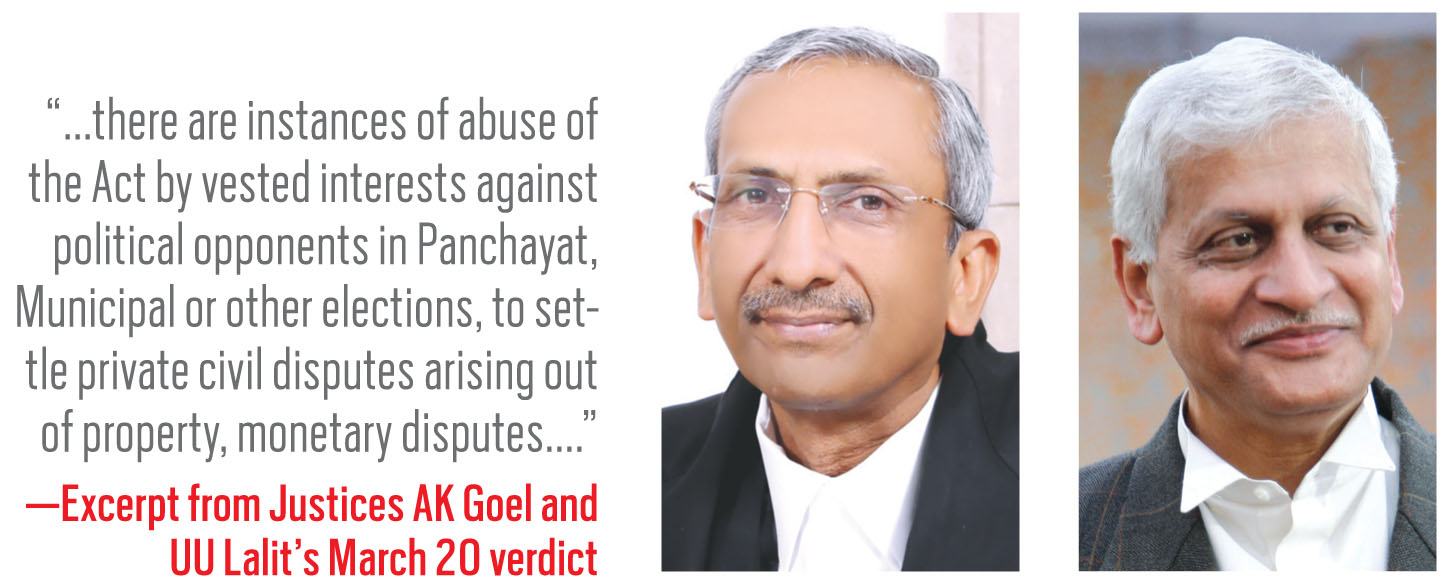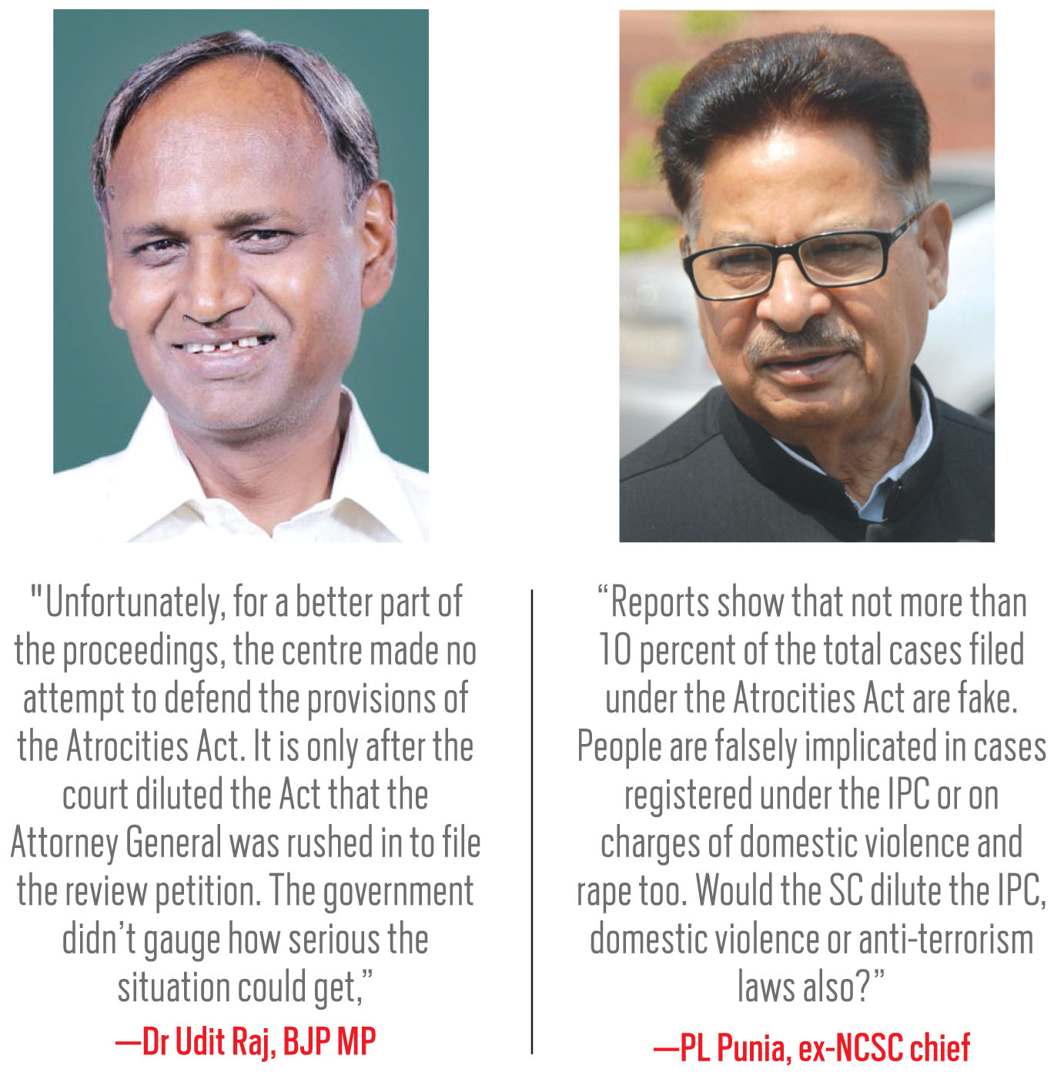Dalit protests on Delhi-Agra highway. Photo: UNI
Amid widespread agitation against the Supreme Court’s decision to allegedly dilute the SC/ST (Prevention of Atrocities) Act and a deafening political backlash, the Modi government has been forced to seek a review of the verdict
~By Puneet Nicholas Yadav
O n April 4, a minor Dalit girl stormed into the office of the superintendent of police of Satna district in Madhya Pradesh. The girl was carrying a six-month-old foetus in a plastic bag. The girl claimed that seven months earlier, she had been abducted and raped repeatedly—over a span of two months—by one Neeraj Pandey and two of his accomplices and become pregnant.
After being let off by her captors, the girl had reportedly made unsuccessful attempts to file a police complaint of abduction and rape against Pandey under various sections of the Scheduled Castes and Scheduled Tribes (Prevention of Atrocities) Act and the Indian Penal Code. His family had then promised to get her married to him if she agreed not to file a case against him. Then, on April 3, as the girl was going to see a doctor along with her mother, Pandey and his accomplices allegedly abducted her again and took her to the residence of a local doctor—Sapna Pandey—where she was forced to abort her six-month-old foetus and given death threats. The girl alleged that even after this horrific ordeal, local police officers refused to register her complaint against Pandey and his accomplices, accusing her instead of having consensual sex with her assaulter and then blackmailing him. She was thus forced to approach the Satna SP—Rajesh Hingankar—carrying her aborted foetus with her.
Till a day after her complaint, no arrest had been made, though Hingankar had referred her complaint to BD Pandey, superintendent of police (Satna city), for appropriate action. A case was finally filed under relevant sections of the IPC and the SC/ST Act.
The purpose of relating this sordid incident is that it comes nearly a fortnight after the Supreme Court, in a widely criticised and controversial verdict, diluted the SC/ST Act. The Court had quashed the stringent social justice legislation’s provisions mandating immediate arrest of persons accused of offences named in the Act and denying anticipatory bail to them in these crimes.
The Supreme Court bench of Justices AK Goel and UU Lalit had, in their March 20 verdict in the Subhash Kashinath Mahajan v/s the State of Maharashtra case, set an outer limit of seven days for a “preliminary inquiry” to be held into a complaint filed under the provisions of the SC/ST Act against a non-Dalit or tribal to determine whether a case could be registered against the accused.
The SC verdict had further said: “The underprivileged need to be protected against any atrocities to give effect to the Constitutional ideals… At the same time, the said Act cannot be converted into a charter for exploitation or oppression by any unscrupulous person or by police for extraneous reasons against other citizens…We are of the view that cases under the Atrocities Act also fall in exceptional category where preliminary inquiry must be held. Such inquiry must be time-bound and should not exceed seven days. Even if preliminary inquiry is held and case is registered, arrest is not a must.”
The Supreme Court’s verdict, against which the centre reluctantly filed a review petition on April 2 following widespread violence and a deafening political backlash, if not overturned, has the potential to adversely affect the investigation and subsequent judicial proceedings in cases like the one cited of the raped Dalit girl. The judgment takes away the protective and preventive mechanism that the Act provided to multitudes of Dalits and tribals against oppression by members of higher castes and the apathy shown towards them by public authorities when they dared to speak up.
A look at the data collated by the National Crime Records Bureau (NCRB) over successive years is enough to reveal how vulnerable Dalits and tribals remain and how their quest for justice is frustratingly unending. The latest NCRB “Crime in India” report for the year 2016 shows that there had been a sharp decline in conviction in cases registered under the SC/ST Act. From the already abysmal 38 percent in 2010, the conviction rate for crimes against SCs had fallen to an appalling 16 percent in 2016. For STs, the scenario was worse with the conviction rate falling from 26 percent in 2010 to just around 8 percent in 2016.
As many as 40,801 crimes against SCs were registered across the country in 2016, up from 38,670 the previous year. The NCRB data also shows a massive spike in the pendency of cases and a decline in the number of those where the trial was completed. In 2010, the number of pending cases was 31,931 while it increased to 41,191 in 2016. According to a reply tabled by Union Minister of State for Home Affairs Hansraj Ahir in Parliament, a total of 38,564 cases were registered for alleged crimes against Dalits in 2016 but chargesheets were filed in only 73.8 percent of these cases.
Many Dalit and tribal rights activists believe that the Supreme Court, while delivering its verdict, proceeded on the presumption that a majority of the cases filed under this law are bogus and motivated by the spirit of blackmail and so the legislation was blatantly misused to harass non-SCs/STs.
Consider this observation of Justices Goel and Lalit in their verdict: “There can be no dispute with the proposition that mere unilateral allegation by any individual belonging to any caste, when such allegation is clearly motivated and false, cannot be treated as enough to deprive a person of his liberty without an independent scrutiny. Thus, exclusion of provision for anticipatory bail cannot possibly, by any reasonable interpretation, be treated as applicable when no case is made out or allegations are patently false or motivated. If this interpretation is not taken, it may be difficult for public servants to discharge their bona fide functions and, in given cases, they can be blackmailed with the threat of a false case being registered under the Atrocities Act, without any protection of law… even a non public servant can be blackmailed to surrender his civil rights.”
Congress leader and former Chairperson of the National Commission for Scheduled Castes (NCSC), PL Punia, believes that by presuming that a majority of the cases filed under the Atrocities Act are bogus, the apex court had set a “dangerous and unfair precedent”. He told India Legal: “Various reports by the government and the NCRB have proved that not more than 10 percent of the total cases filed under the Atrocities Act are found to be fake. However, the apex court seems to have assumed—and the government let it assume—a contrarian view. People are falsely implicated in cases or murder or dacoity that are registered under the IPC or on charges of domestic violence and rape or even in cases linked with terrorism. Would the Supreme Court now dilute stringent provisions in the IPC, domestic violence Act or various anti-terrorism laws?”
There is no denying that a large part of the blame for the dilution of social justice legislation by the apex court rests with Prime Minister Narendra Modi’s government which, many believe, failed to adequately defend the law’s provisions. Coming as it does at a time when the government is facing an uphill task of winning back the electorally significant Dalits and tribals ahead of assembly elections due later this year and leading up to the general election of April-May 2019, the verdict’s political fallout is massive.
The successful albeit violent and disruptive, Bharat bandh call given by Dalit organisations on April 2—which coincided with the centre moving a hurriedly drafted review petition in the Supreme Court, only to be deferred for a full hearing later this month—established unequivocally that the SCs and STs largely blame the Modi government for the dilution of the Atrocities Act.
The centre reportedly decided to file the review petition after the over three dozen Scheduled Caste MPs of the BJP along with the party’s allies like Union ministers Ram Vilas Paswan and Ramdas Athawale urged the prime minister to do so. While Modi has maintained his characteristic silence over the backlash, he has left his ministers—Home Minister Rajnath Singh and Law Minister Ravi Shankar Prasad—to assure the affected communities, in vain, that the government is sensitive towards them and won’t allow the Atrocities Act to be watered down.
Several Dalit MPs of the BJP whom India Legal spoke to conceded that the government could have been more proactive. “When the Court asked the centre to make its submissions in the case, the law ministry should have ensured that it sent Attorney General KK Venugopal to plead. Unfortunately, for a better part of the proceedings, the centre was represented by an additional solicitor general who made no attempt to defend the provisions of the Atrocities Act. It is only after the Court diluted the Act and the Opposition-backed Bharat bandh put the government on notice that the attorney general was rushed in to file the review petition. This shows that the government didn’t gauge how serious the situation could get,” Dr Udit Raj, Dalit activist-turned BJP MP said. He added that the situation “could have been salvaged had the BJP leadership been receptive to issues raised by its MPs from the Dalit and tribal communities but unfortunately, they have no voice in the party or the government”.
The way ahead for the centre with regard to the review petition looks daunting. The apex judiciary is currently saddled with infighting among its seniormost judges. Chief Justice Dipak Misra is staring at the possibility of a united Opposition moving an impeachment motion against him, while a section of his brother judges accuse him of doing the Modi government’s bidding in judicial pronouncements and appointments. It remains to be seen whether the review petition will, in this disturbing scenario, become another flashpoint between the Executive and the Judiciary. Until then, the Dalit and tribal communities have no option but to wait and watch whether a law meant to curb atrocities against them turns into one which abets their oppression. Will they blame the Judiciary or the Executive for this atrocity by law? The latter looks more plausible.
“SC can’t remain a mute spectator to atrocities on Dalits”
 Former Lok Sabha MP Prakash Ambedkar, grandson of Dr BR Ambedkar, who has been in the vanguard of Dalit agitations since the caste clashes in Pune districts Bhima-Koregaon on January 1 this year, spoke to India Legal’s Puneet Nicholas Yadav about the apex court’s verdict in the Subhash Mahajan v/s the State of Maharashtra and Anr case. Excerpts:
Former Lok Sabha MP Prakash Ambedkar, grandson of Dr BR Ambedkar, who has been in the vanguard of Dalit agitations since the caste clashes in Pune districts Bhima-Koregaon on January 1 this year, spoke to India Legal’s Puneet Nicholas Yadav about the apex court’s verdict in the Subhash Mahajan v/s the State of Maharashtra and Anr case. Excerpts:
The SC verdict has been widely criticised as one that dilutes the SC/ST Act. What is your opinion?
The case before the Supreme Court was an appeal against a Bombay High Court verdict. The Court was supposed to adjudicate on whether charges made out under the Atrocities Act against Dr Subhash Kashinath Mahajan, the Director of Technical Education, Maharashtra, following a complaint filed by Bhaskar Karbhari Gaidwad, a Scheduled Caste employee of the department, should be quashed or not. However, the Court, without such a prayer being made, decided to review the provisions of the Atrocities Act. The result is a serious miscarriage of justice and blatant judicial excess.
The court appears to have proceeded on the ground that there was rampant abuse of the Atrocities Act and that many complaints filed under it were aimed at blackmailing or harassing non-SC/ST public authorities or rivals.
The preamble of the Act is centred on a key word—prevention (of atrocities against SCs and STs). The provisions—denial of anticipatory bail, immediate arrest—which have now been diluted—were meant to be tools for this prevention. Without these provisions, the Act is redundant. The Atrocities Act was a well-drafted piece of legislation with enough safeguards within it to prevent its abuse. Now, the investigation process laid out under the Act has been diluted and that is a major cause of concern because if a case is derailed at the investigation stages, then there is no hope of securing prosecution of the offenders.
The Court has quoted the National Crime Records Bureau (NCRB) 2015 report in its verdict. It says that closure reports were submitted in 15-16 percent of the cases filed under the Atrocities Act and that in 75 percent of the cases, there had either been an acquittal or withdrawal. Does this not support the view that the Atrocities Act is misused rampantly?
This interpretation is flawed. The Court has mentioned this data in a single fleeting sentence. The judges didn’t seem bothered to find out why these closure reports were filed or why such a large percentage of cases had ended in acquittals or were withdrawn. Stringent provisions of the Atrocities Act were meant to enable Dalits and tribals to get justice—something they have been denied for centuries in our country due to caste hierarchy. However, members of these communities face all kinds of intimidation tactics even after they file cases invoking this Act. This is why denial of anticipatory bail and immediate arrest were extremely important provisions so that the accused don’t pressurise the complainant to withdraw the case or influence investigators to bury evidence and secure acquittal.
The centre didn’t seem keen on filing a review petition before the SC. It sought a review only after a delegation of Dalit MPs from the BJP and Union ministers like Ram Vilas Paswan and Ramdas Athawale urged Prime Minister Narendra Modi. Do you think the government is serious about ensuring that the Atrocities Act isn’t diluted?
The role of the centre as well as the BJP-led Maharashtra government, which were both parties in the case before the SC, has been mischievous. During arguments in the apex court, neither the centre nor the state government showed any seriousness in defending the Atrocities Act. This, I believe, is because the BJP and its government are essentially Brahmanical in their ideology and social outlook. They feed on the divisions in society to stay in power. Despite the harsh criticism of the verdict, the widespread protests by Dalits, activists and even BJP MPs, the centre seemed too meek when it moved the review petition, while the Maharashtra government wasn’t even keen on being a party in seeking the review. For the BJP, it makes political sense to keep the Dalits and tribals oppressed so that they can polarise the electorate and continue to enjoy power. The narrative built by their social media managers in the aftermath of the verdict has been about ending reservations, though the judgment has absolutely nothing to do with quotas for SCs and STs.
It appears, for now, that the apex court isn’t keen on reviewing its verdict.
The apex court bench (of Justices AK Goel and UU Lalit) seems to have forgotten that this is a sovereign nation where the will of the people is supreme.The Supreme Court is not and cannot act like a Sultanate. If the people are agitated because of a verdict given by it and there is unease among millions of people about their safety and security, the highest court of the land cannot remain a mute spectator; it is bound by law to re-visit the verdict. I do not wish to impute any motives, but perhaps the Supreme Court would have shown greater sensitivity to this issue if its benches had judges that belonged to the Dalit or tribal communities. Perhaps the composition of the current Supreme Court benches is the reason why the verdict had a prolonged discussion on the dignity of the accused (non-SC/ST person), while keeping silent about the dignity of the Dalit or tribal victim.





